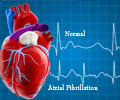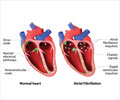Patients having Atrial Fibrillation are likely to develop brain injury and subsequent neurodegenerative symptoms such as cognitive decline and dementia.

‘‘Identification of early markers of brain injury is very crucial to help patients who are at high risk of developing neurodegenerative problems’.’





They found that levels of three of those biomarkers - Tau, GDF15, and GFAP - were significantly higher in patients with atrial fibrillation. Findings from the study were presented at the American Heart Association Scientific Session conference in Chicago. "We think patients with atrial fibrillation experience chronic, subclinical cerebral injuries," said Oxana Galenko, PhD, a molecular biologist at the Intermountain Medical Center Heart Institute, and the study's lead investigator. "It becomes absolutely critical to identify the early markers of this injury and help these patients who are at higher risk of having subsequent neurodegenerative problems, such as cognitive decline and dementia."
Atrial fibrillation is an irregular and sometimes rapid heartbeat that can lead to blood clots, stroke, heart failure, and other heart-related problems. Between 2.7 and 6.1 million Americans suffer from the condition, according to the Centers for Disease Control. It causes 750,000 hospitalizations and 130,000 deaths each year.
If people with atrial fibrillation are indeed suffering from ongoing brain injuries, they can also be at higher risk of developing everything from depression to neurodegeneration, which is the deterioration or death of the body's nerve cells, especially neurons in the brain, which could cause losses in mental function, said Dr. Galenko.
Dr. Galenko said that could be because atrial fibrillation alters blood flow through the body, including to and from the brain, which could lead to cerebral injury and disruption of the blood-brain barrier, which filters blood to and from the brain and spinal cord. If it's not working correctly, neuro-specific molecules like GFAP and Tau get into the bloodstream, which was seen in this study.
Advertisement
She believes a blood test would be the way to move forward if a method was developed to see which atrial fibrillation patients are also experiencing brain injury, for the simple reason that it's a lot cheaper and easier to do than an MRI.
Advertisement
Source-Eurekalert















